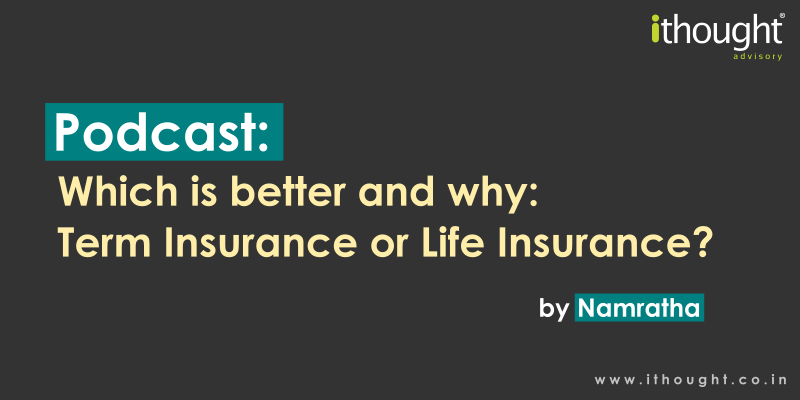
https://soundcloud.com/ithought-advisory/which-is-better-and-why-term-insurance-or-life-insurance
Hi everyone, this is Namratha Jain from the financial planning team of ithought. In today’s podcast, I’m going to talk about two life insurance products – Term Insurance & Whole Life insurance and also which one is better and why. Let me help you understand by explaining what these two life insurance products are.
As the name suggests, term insurance is valid for a specific term and offers a death benefit to the nominee in the event of the death of the insured. Term plans are one of the most affordable and beneficial life insurance plans. Keeping your family financially safe and independent in the unfortunate event is the most important goal, the nominal cost of term cover does not hurt.
Main characteristics of Term insurance are-
- They provide financial coverage to the policyholder for a specific period
- Term policies do not come with an investment component and have no value other than guaranteed death benefit to the policyholder
- As they are pure protection plans, there is no maturity benefit payable if the insured survives the policy term
A whole life policy is a type of life insurance that provides guaranteed death benefits during the entire life of the policyholder. If the insured dies before the age of 100, the nominee receives the sum assured. If he survives, then the insurance company pays matured endowment coverage to insured.
Some of the features of whole life policy are-
- Provides coverage until the death of the life assured or up to the age of 100 years
- These policies have a cash value component in some specific cases
- On completion of the policy, a Guaranteed Maturity benefit is given to the policyholder
Let us understand which is better and why?
Life insurance is one of the most important financial decisions one can make. This is meant to provide security for your family should the unthinkable happen. So, when we look for life insurance, we should understand that insurance should cover you until you retire and by the time you retire you would have a large enough retirement corpus to take care of your financial responsibilities. However, Whole life insurance can be used to create a legacy for the next generation. It is a way to create a wealth corpus which is guaranteed on death.
Premium is an important factor and it depends on factors like age, health records, lifestyle, etc. When comparing the premiums for these two policies, Term insurance is much more affordable than whole life insurance as it does not have any cash value. As you age, premiums become more expensive and it is imperative that you are adequately insured throughout. However, Whole life insurance policies are more expensive as they give guaranteed death and maturity benefits.
We can understand this with an example:
Ankur aged 30 years, was investment savvy. He had a diverse financial portfolio to take care of his financial needs. When it came to life insurance, Mr. Ankur was assured that the plan he had invested in was adequate for his needs. He was paying a premium of Rs 30,000 every year for a whole life policy having a sum assured of Rs 1 crore. The policy term was 99 years and he was happy with the fact that the policy gave him the guaranteed maturity benefits if the insured survives the entire term. But if he takes a Term policy, he can get the same sum assured for a lesser premium of Rs. 11,510 which would give coverage up to 60 years.
When it comes to life insurance, the primary motive of the policy is to provide financial security. Term plans allow affordable coverage. Given the huge difference in the premium rates, affording a high coverage under any life insurance plan, except term insurance, is difficult. The thumb rule states that you should have a minimum life insurance cover of 10 times your annual income or enough to meet future living expenses and value of financial goals after accounting for inflation. Only term plans can give you sufficient cover without burning a hole in your pocket.
Ankur only needs insurance until his retirement i.e. 60 years. He knows that he will have a large enough retirement corpus to support his expenses while he is alive and that he will provide for his children and wife by saving consistently. There was no need to create a legacy through a whole life policy. Most people retire when enough wealth is accumulated and may not need insurance after retirement. In Ankur’s case, whole life insurance was not required. So, term insurance worked out to be the best option as it protected his family against such unforeseen life risks at a very affordable rate of Rs.1000 every month. A whole life insurance policy of similar value would cost nearly 3 times as much.
I hope this podcast was useful and will help you to choose your insurance wisely. If you need any assistance on the same, feel free to reach out to us and we will be glad to help you.